Japan's Future Business: 21 Businesses Find Success with Heart and Soul
CONTENTS
Japan's Way of Human Resource Development
New IT Companies Practice "Hitozukuri" (People-Making)
Globalization of corporate activity is rapidly advancing in Japan, pressed by the rise of the newly emergent nations. It may be meaningful to think anew about the value contained in doing things "the Japanese way," today when we need to build another advantage or strength in order to survive some difficult competition.
We can find some examples in the background of some young IT companies where "the Japanese way" is alive and well in their management principles. Digital Hearts (located in Shinjuku City, Tokyo) performs operation verification and debugging for home game software, cell phone applications and other gaming systems.

Digital Hearts has established a unique User Debug method that checks for defects including those that might occur during operations or in situations that are not anticipated by the developer but that the user might encounter, or minor defects that are still "nuisances" from the user point of view. Since its founding in October 2003, in the four years and three months up to February 2008, it achieved a public listing on the Tokyo Mothers exchange.
Digital Hearts president Eiichi Miyazawa is remembered for saying "There are no slackers among freeters (a Japanese expression for people who lack full time employment), they just don't have a place to go," quoted in the Diamond Weekly magazine of March 7, 2008. He has indeed hired a large number of former freeters over time, educating them into "socially productive technicians."
It's probably no exaggeration to say that Digital Hearts' remarkable growth is due precisely to this attention to "hitozukuri," literally "people-making," or a mindful approach to human resource development. With this difficult economic environment, and capacity among Japanese businesses for investment in education and nurturing of human resources gradually slipping away, we might do well to consider anew the weight of the adage, "business is people."
Another company, en-japan, which is the leading online job agency (Shinkjuku CIty, Tokyo), so deeply values its company philosophy "Ningen Seicho (Personal Development)" that it has copyrighted the phrase.
“Changing jobs mindfully”
En-Japan's mission is "Connecting people, then connecting people and business." Most job recruitment companies would describe the process as "matching up businesses with workers." Also, for "connection," en-japan uses the character "en," which can mean "emotional ties" and "bond" as well, and is a very Japanese way to express the idea.
The placement of the terms "social justice" and "uniqueness" in the beginning of the company policy statement is very thought-provoking. If en-japan were thinking only of business growth and profits, then "hurray for changing careers!" would underlie any statement of business intent. But I can certainly identify with their challenging the order of the day with their near to obsessive upholding of the slogan "Changing jobs mindfully."
On the flip side, last year the common occurrence of mobile phone gaming sites billing huge fees to users was a major problem. Though billed on commercials as "no fee," items or objects needed to play the game were not free, and fees would accumulate quickly as the game was played.
In a sense, for the purpose of optimizing profits, this would be an acceptable way to do business, but shouldn't the games have been designed so there would be less miscommunication, with the fee structure easier to understand and fully explained to the user? Further, "duty first, profit after," namely honoring those who put duty to the customer ahead of profit should be somewhere in the canon of Japanese style business ethics.
On the other hand, environmental technology, where Japan is at the top level in the world, is a boon of the experience Japan has had in conquering, under its own power, various environmental issues that became critical during the period of high economic growth. Environmental technology is a valuable asset in which Japan remains highly competitive internationally.
Founded in 1869 as a mining operator DOWA HOLDINGS (Chiyoda City, Tokyo) in addition to its original refinery operations has become known for its environmental businesses in waste processing, soil remediation and metal recycling.
The roots of Dowa's technologies are in its techniques for handling the kuroko ore or black ore that is found throughout the mineral deposits mainly on the Japan Sea coast. In kuroko ore is contained many useful metals such as silver and gold, but processing it is difficult and not much progress towards efficient use of the material had been made. Dowa continued its low profile research and development efforts, accumulating various techniques for recovering the many types of metals that are contained in black ore.
As a result of these efforts, Dowa now leads in the recovery of precious metals and rare metals, to the point that it is now appreciated as one of the key players supporting Japan's "advantage" in recycling technology.
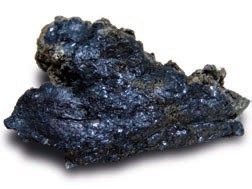
Another company, ELIIY Power (Shinagawa City, Tokyo) which began as a venture enterprise that grew out of a Keio University project, with an eye toward the eventual widespread use of the electric car which is seen as the most likely candidate to be the next generation of cars, is involved in the manufacture as well as research and development of large capacity lithium ion batteries.
ELIIY Power president Hiroichi Yoshida is promoting the spread of solar power and lithium ion batteries in America and other regions under "Store Power, Store Energy," with the idea of reducing consumption of fossil fuels and raising the standard of living for people in developing nations, as well as contributing to worldwide population control.
"In order to make efficient use of the precious resources on our planet, through developing the wide-spread use of large capacity lithium ion batteries, we are working to improve planetary environmental issues." (from the ELIIY Power website) This unique consciousness of public service issuing from a resource-starved island like Japan is anticipated to create a new global standard.
Selling Anime and Gourmet to the World
Now as anime and manga have become part of a global language, culture emanating from Japan has been accepted on a worldwide basis, and there are a number of growing businesses in this field.
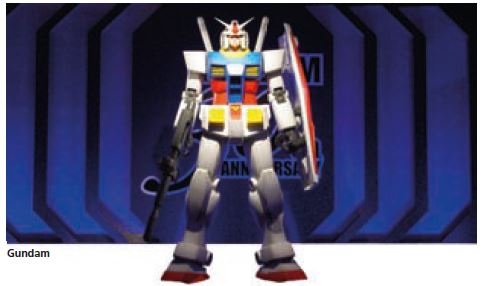
For example, SOTSU (Chuo City, Tokyo) is known for its planning, production and copyright management of MOBILE SUIT GUNDAM and many other animation works.
It was late last year that a giant statue that looked just like a copy of GUNDAM appeared in the Flora Land amusement park in Chengdu, Sichuan, China - it was torn down just a few days later. Paradoxically, this incident of infringement is living proof of just how much Japanese anime contents are beloved all over the world.
Yet, creators must be ever vigilant. In China there is currently a very popular Chinese anime called Pleasant Goat and Big Big Wolf (English title) which presents slapstick episodes about goats named Shiyanyan and a wolf named Hoitairan. There are already character goods on the market as well as an amusement park.
Though a bit off the track, the kind of cheap local cooking known as "B-class gourmet (cheap local food), see the related article" from Japan, headed by kaiten conveyor belt sushi restaurants, seems to have become a world taste. SHIGEMITSU INDUSTRY (Kumamoto City) which developed the Ajisen Ramen chain of ramen (noodle) shops, one of the sources of Kumamoto ramen, has opened more than 520 ramen shops in 11 countries including China, America and Canada. Shirohato Foods (Moriguchi City, Osaka) which operates the takoyaki (grilled octopus) shop Tako-ya Dotonbori Kukuru, a big hit at the Shanghai Expo, opened its first shop in China in Shanghai last December.

Another inimitably Japanese lifestyle service business, this one concerning weddings, has started its overseas expansion, this one being WATABE WEDDING (Shimogyo Ward, Kyoto), which has opened service centers in Hong Kong, Taiwan and Shanghai.
More and more Japanese traditional arts and locally produced goods are taking a stab at overseas expansion. For example, IWACHU (Morioka City, Iwate Prefecture) is a top maker of traditional nambu tekki ironware which has been exporting iron kettles and small teapots since 1960. At one time in Europe nambu ironware was actually called IWACHU ware due to its strong popularity.
The café at New York's Museum of Modern Art (MoMA) uses teapots made by IWACHU. A number of nambu ironware makers including IWACHU are collaborating with Finland's Green Design to beef up overseas distribution.
Within the lifestyle cultures that have grown up within Japan's topography may be found the seeds of hit products that can conquer the world.
The relentless refining of technique and product quality, and the single-minded attention to user needs, have fostered the "advantage" of Japan's monozukuri manufacturing tradition (knowledge-based or highly skilled manufacturing). When the spirit of innovation is added to the mix, we find many Japanese companies that have created de facto global standards in manufacturing.
One example is Komatsu (Minato City, Tokyo), which has developed a vehicle control system installing GPS and communication devices into its construction equipment so that the whereabouts and operation status of the equipment can be controlled from a separate location. The original intent was to prevent theft, but this has now become a de facto world standard. The GPS systems are being used for various purposes including to track down vehicles that are near scheduled maintenance, and to have replacement parts prepared at local service centers.

Some are giant corporations like Komatsu, but there are not a few small- and medium-sized enterprises and leading mid-sized firms that are among the "world's best." The capacitor manufacturing equipment of Hi-MECHA, located in Yonezawa City, Yamagata Prefecture, are found all over the world and are the world standard in this type of equipment.
Capacitors are a key component in mobile devices such as cell phones, laptops, digital cameras and iPods, as well as commercial devices like IC tags as these devices become more compact and high performance. About 75% of the approximately 30 billion digital capacitors made annually are manufactured using Hi-MECHA equipment.
Hi-MECHA workers refer to the products that they work on one by one to customize to each customer's needs as "my machine." They devote time and careful effort to each, as if the machine were their own child. When president Toshihiro Kamemori visited the plant floor in 2007, he said, "Our customers are our teachers – we are the result of our customers."
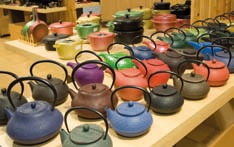
But there is a blind spot in Japan's monozkuri manufacturing which with its highly refined technology and product quality has boosted Japan's competitive edge. The high cost of items that are built to "Japanese specifications" means that in terms of price they are not able to beat foreign made products on the market, even though Japan made is superior technically and high in product quality. For this reason, recently there are an increasing number of companies that are exploring a strategy of downgrading product specifications, aiming at the global market. Product development that has drawn from the needs of the local user is also indispensable to success. So a major challenge going forward is going to be a strengthening of the management practices of the monozukuri manufacturing industry in Japan.
Last April, the Tatebayashi plant of Ogihara (Ota City, Gumma Prefecture) which is the world's largest maker of large scale metal dies for automobile body manufacturing was acquired by China's BYD Auto. Ogihara had hit the wall in terms of cash flow, and unable to obtain additional financing from banks, the year before last became majority owned by a Thai concern. Japanese enterprises which have world leading technologies can still easily fall into foreign ownership because of worsening conditions and management practices.
"Truth of Heart" Powers Growth
Finally, let's look at some small- and medium-sized enterprises that have achieved high growth and are permeated throughout with the Japanese quality of magokoro, which is "sincerity", or "truth of heart".
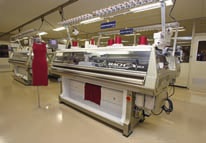
Pan Akimoto (Nasushiobara City, Tochigi Prefecture) was originally a small neighborhood bakery. When it delivered 2,000 loaves of bread to the site of the Kobe earthquake in 1995, it received a letter from a survivor, saying "we wish you could make bread that comes in a can so it would have a long shelf life, but comes out fluffy and moist like fresh-baked bread." This galvanized the company's resolve to develop Pan no Kanzume, or canned bread.
Now this same canned bread is a major hit, being produced to the tune of about 2 million units a year. Besides its application among public agencies as an emergency response food, it is also being used for outdoor recreation, souvenir and gift item. Pan no Kanzume received considerable publicity when it was carried along on the space shuttle Discovery launch in March 2009.

At present, Pan Akimoto is implementing its Kyukan-cho Project (kyukancho means mynah bird, and the project is a play on words because kyukan also means "Aid Can"). This project allows consumers to trade in their canned bread that has a three-year shelf life after two years have passed for it to be donated to international relief programs. Pan Akimoto has patents for its canned bread in America, China and Taiwan besides Japan. It started operations at a plant in Okinawa in 2005 in anticipation of its advance to overseas markets. For now the company is concentrating its overseas market development efforts on America, Hong Kong and Taiwan.
Another company worth mentioning is Tsukioka (Kakamigahara City, Gifu Prefecture), a hot stamping company founded in 1966.

Hot stamping was originally a technique for placing gold or silver leaf onto paper or fabric in the shape of letters (characters) or patterns. Today, its most common use is in the crimping of foil film onto merchandise packaging. Tsukioka is involved in the hot stamping of logos and designs onto packages for chocolate, cosmetics, cigarettes, and pouch packed foods.
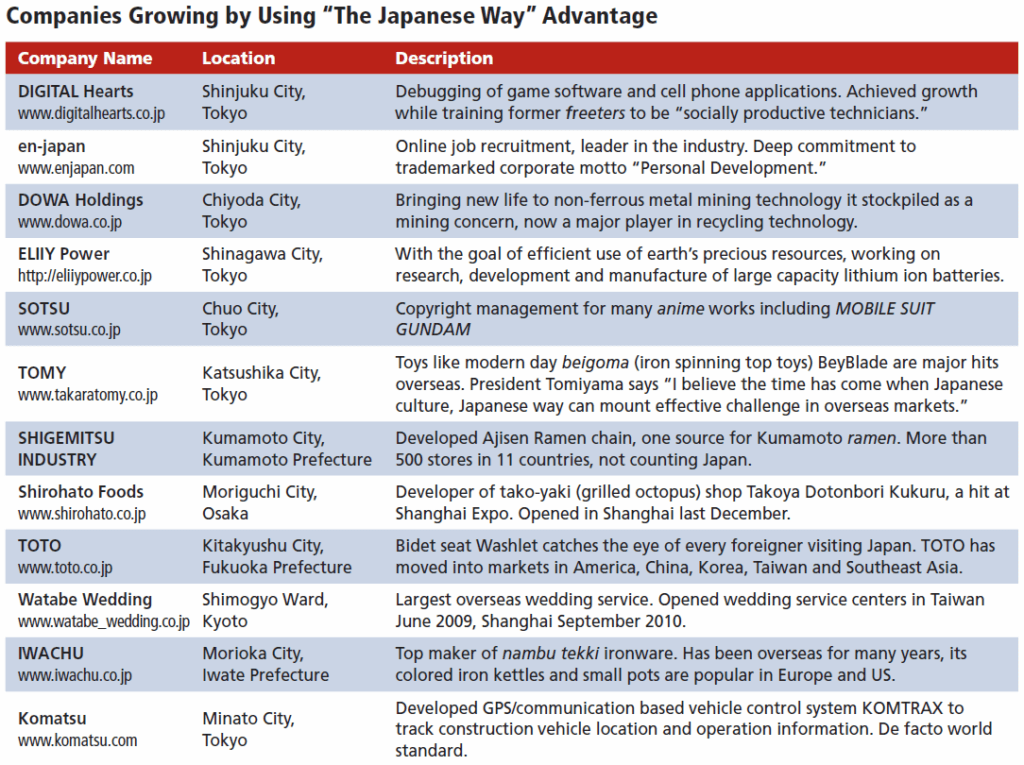

Tsukioka's motto is "We always make a new dream the Number One." When I visited their offices in 2009, I noticed a slogan posted on the front door that read, "Is it New?"
In 1994, making new use of their traditional hot stamping technology, Tsukioka offered the first commercial shaped design edible gold leaf product to the world. Again in 2002, it started production on its independently developed water soluble edible film (placed on the tongue, it dissolves quickly in the mouth). It has since brought edible film to the pharmaceutical industry, successfully developing its "pharma film" which delivers medicine or active ingredients quickly as it dissolves within seconds in the mouth.
"There are many people in the world that have difficulty swallowing water, much less medicine. This pharma film can be administered to the elderly or to children without water, without risk of blocking the airways, and we think it has the potential for rapid market expansion," says company director and head of development Misao Nishimura.
After receiving a license to manufacture drug products in 2007, Tsukioka made the first application in Japan for a new form of drug to the Ministry of Health Labor & Welfare for its pharma film. It received permission last October and by the following month its product was already on the market from a major Japanese drug maker.
At the daily morning assembly among employees of the pharma film related division, which is expected to be the next main engine of growth for the company, employees chant together, "Tsukioka is curing 600 million people with the world's only pharma film technology," before getting down to work.
With heart and soul, without chasing after quick profits, for the sake of helping people…. All we see in the media is stories about the stagnation of the Japanese economy, but we should not overlook these activists among companies, doing things "the Japanese way" and looking to become the next success story.


